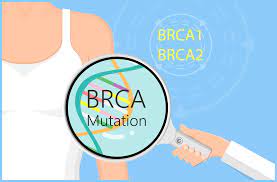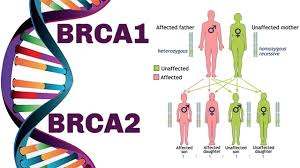
BRCA1 and BRCA2 Mutations: Understanding the Genetic Link to Cancer Risk
By Dr. Amit Tandon – Dr. Kamlesh Tandon Hospital, IVF Center and Robotic Surgery Center, Agra
What are BRCA1 and BRCA2?
BRCA1 and BRCA2 are tumor-suppressor genes that help repair damaged DNA and keep cells growing normally. Mutations (pathogenic variants) in these genes can impair their function, leading to an increased risk of certain cancers, especially breast and ovarian cancer.
Key Points About BRCA1/2 Mutations
| Aspect | BRCA1 | BRCA2 |
|---|---|---|
| Chromosome location | 17q21 | 13q12.3 |
| Lifetime breast cancer risk | Up to 70–80% | Up to 60–70% |
| Ovarian cancer risk | Up to 40–50% | Up to 20–30% |
| Other associated cancers | Prostate, pancreatic, melanoma (less common) | Prostate, pancreatic, melanoma, male breast cancer |
| Typical age of onset | Often <50 years | Similar, but slightly higher age range |

Why Testing Matters
- Early detection & prevention – Knowing carrier status helps plan surveillance (e.g., MRI, mammograms from a younger age) or risk-reducing surgeries.
- Family planning – Genetic counseling can guide reproductive options, including pre-implantation genetic testing (PGT) at our IVF center.
- Targeted therapy – PARP inhibitors are effective in cancers with BRCA mutations, offering personalized treatment options.
How Are BRCA Mutations Inherited?
- Autosomal dominant inheritance: A mutation from either parent gives a 50% chance of passing it to offspring.
- De novo mutations are rare but possible.
Who Should Consider BRCA Testing?
- Personal history of breast or ovarian cancer (especially early-onset).
- Family history of these cancers (multiple relatives, male breast cancer, etc.).
- Ashkenazi Jewish ancestry (higher carrier frequency).
- Known BRCA mutation in the family.
Testing Process at Dr. Kamlesh Tandon Hospital
- Genetic counseling – A detailed family history review and discussion of risks/benefits.
- Blood or saliva sample – Sent to a certified genetics lab.
- Result interpretation – Our specialists explain findings and recommend next steps (surveillance, surgery, or lifestyle advice).
Management Options for Carriers
| Option | Description |
|---|---|
| Enhanced surveillance | 6-monthly clinical breast exams, annual mammography + MRI, transvaginal US & CA-125 for ovarian screening. |
| Risk-reducing surgery | Prophylactic mastectomy (reduces breast cancer risk by ~90%) and/or salpingo-oophorectomy (reduces ovarian cancer risk). |
| Chemoprevention | Medications like tamoxifen or aromatase inhibitors can lower breast cancer risk (discuss with oncologist). |
| Lifestyle measures | Healthy diet, regular exercise, limiting alcohol, avoiding hormone replacement therapy. |
Why Choose Dr. Kamlesh Tandon Hospital for BRCA Care?
- Multidisciplinary team of genetic counselors, oncologists, surgeons, and reproductive specialists under one roof.
- State-of-the-art genetic testing with rapid turnaround.
- IVF and fertility-preservation options for carriers planning families (e.g., egg/embryo freezing, PGT).
- Robotic surgical expertise for minimally invasive risk-reducing surgeries, ensuring quicker recovery.
References
- Goodman & Gilman’s The Pharmacological Basis of Therapeutics – 13th edition, p. 1234 (section on PARP inhibitors & BRCA).
- Robbins & Cotran Pathologic Basis of Disease – 10th edition, p. 567 (Genetic basis of breast/ovarian cancer).
- National Comprehensive Cancer Network (NCCN) Guidelines – Genetic/Familial High-Risk Assessment: Breast, Ovarian, and Pancreatic (2024).
Hospital Details & Contact
Dr. Kamlesh Tandon Hospital
IVF Center and Robotic Surgery Center, Agra
Phone:
Email: info@drkamleshtandonhospital.com
Website:
Key Contact for BRCA Testing & Counseling
- Dr. Amit Tandon (Senior Onco-Gynecologist & Genetic Counselor)
Appointment
To discuss BRCA testing, genetic counseling, or fertility options, please:
- Call: 0562-269251
- Email: info@drkamleshtandonhospital.com
We are committed to providing personalized, compassionate care to help you navigate genetic risks and plan a healthy future.



